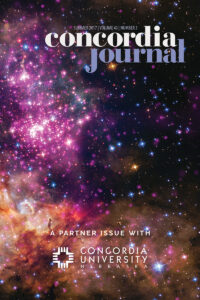 One of the reasons that we devoted an entire issue of the Concordia Journal to the subject of science and faith lay in our concern for the Gospel…but not in the way that you might think.
One of the reasons that we devoted an entire issue of the Concordia Journal to the subject of science and faith lay in our concern for the Gospel…but not in the way that you might think.
For much of the 20th century, the focus has often been (and nearly exclusively so) on the question of origins (especially human evolutionary theory) and the threat it poses to basic Christian truths regarding what Scripture says about the uniqueness of God’s human creatures (being made in his image), their moral responsibility to God and culpability following the fall, the entrance of death into the world, the first Adam and second Adam, etc., etc.
Given this focus, many have risen to challenge evolution by arguing on scientific grounds. This approach, often taken by Christians, sought to play on the field and by the rules of modern science. I don’t want to take anything away from such an endeavor, especially when carried out by those who are trained in science and especially by those who are engaged in scientific research. They can raise valuable questions about lacunae in accepted theories and can debate the science in a way that has scientific veracity. But this approach also carries significant risks by granting science an a priori authority for setting the epistemological rules as well as risks for those who don’t know the science.
In postmodern 21st century America, I believe that another threat presents itself to our witness of the Gospel, one that does not come so much from the science as it does from the church, particularly its pastors and teachers. Human knowledge continues to explode and expand exponentially as a result of new discoveries in science. The pace at which this occurs makes it virtually impossible to keep up with the science from the evidence it considers to the theories and models that it constructs in order to account for the evidence. One can’t simply rely upon basic or superficial understandings of science (including the topic of evolution) that we may have learned decades ago or even a couple years ago.
But if most pastors are like me, we don’t know the science. And that lack of expertise could call into question our personal credibility when we give witness to the Gospel. And that means, we must be careful about how we describe it lest it becomes clear that we don’t know what we are talking about. This becomes all the more risky given the fast pace with which scientific knowledge is moving. If we get the science wrong, what else might we get wrong? Interestingly enough, this is not a new problem. Since the Concordia Journal has come out, several readers have sent us a great quotation from St. Augustine who makes this very point…1600 years ago! Augustine writes:
Usually, even a non-Christian knows something about the earth, the heavens, and the other elements of this world, about the motion and orbit of the stars and even their size and relative positions, about the predictable eclipses of the sun and moon, the cycles of the years and the seasons, about the kinds of animals, shrubs, stones, and so forth, and this knowledge he holds to as being certain from reason and experience. Now, it is a disgraceful and dangerous thing for an infidel to hear a Christian, presumably giving the meaning of Holy Scripture, talking nonsense on these topics; and we should take all means to prevent such an embarrassing situation, in which people show up vast ignorance in a Christian and laugh it to scorn. The shame is not so much that an ignorant individual is derided, but that people outside the household of faith think our sacred writers held such opinions, and, to the great loss of those for whose salvation we toil, the writers of our Scripture are criticized and rejected as unlearned men. If they find a Christian mistaken in a field which they themselves know well and hear him maintaining his foolish opinions about our books, how are they going to believe those books in matters concerning the resurrection of the dead, the hope of eternal life, and the kingdom of heaven, when they think their pages are full of falsehoods and on facts which they themselves have learnt from experience and the light of reason? Reckless and incompetent expounders of Holy Scripture bring untold trouble and sorrow on their wiser brethren when they are caught in one of their mischievous false opinions and are taken to task by those who are not bound by the authority of our sacred books. For then, to defend their utterly foolish and obviously untrue statements, they will try to call upon Holy Scripture for proof and even recite from memory many passages which they think support their position, although they understand neither what they say nor the things about which they make assertion. [1 Timothy 1.7] (Saint Augustine, The Literal Meaning of Genesis, translated by J. H. Taylor in Ancient Christian Writers, Newman Press, 1982, volume 41).
We need to develop a theological approach that is authentic to persons and to our theology. Hopefully, the Summer issue of the Concordia Journal can provide a nudge in that direction….
Additional Resources
While we’re at it, we also wanted to mention the Lutheran Mission Matters, published by the Lutheran Society for Missiology, did an issue on faith, science, and technology in 2016. It includes articles by Concordia Seminary colleagues Joel Okamoto, Tim Dost, Gillian Bond, and David Berger (emeritus).


Leave a Reply
You must be logged in to post a comment.